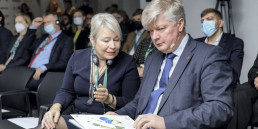On November 25, the AgriFood Forum 2021, the largest international conference on the agrifood sector in the Baltic States, took place in Vilnius. Last year, this annual event, which brings together science, business and political leaders as well as the social partners, took place online, two years ago – a physical event was held. This year a new – hybrid – format was proposed. One hundred special guests and 2,000 online viewers spent eight hours listening for presentations and discussions, which took place in two different halls, by almost 50 leaders on a wide range of topics from regional development, innovative food, the future of the EU agricultural policy or robotics to women’s empowerment, green investment, ecosystem transformation, decarbonization and future visions of the agrifood sector in Lithuania.
“For the first time, the AgriFood Forum in Lithuania was characterized by such great interest from representatives of different sectors, decision-makers of various public authorities and actors of the local innovation ecosystem. This year, the forum attracted the largest number of influential agrifood sector actors not only from Lithuania, but also from the European Union and all over the world. During the discussions and presentations, we heard clear suggestions on what needs to be done if we want to implement a sustainable food value chain in Lithuania, solve regional problems and create a better innovation ecosystem both at the national and EU level, ” said Kristina Šermukšnytė-Alešiūnienė, the director of the AgriFood Lithuania DIH.
The Speaker of the Seimas of the Republic of Lithuania Viktorija Čmilytė-Nielsen, who gave a welcome speech at the Forum, said that sustainability is not a limitation. Sustainability is about maintaining balance with nature. It is qualitative growth. During his presentation, the Minister of Agriculture of the Republic of Lithuania Kęstutis Navickas highlighted the necessity of changes in the current living standards of the society. According to the Minister, it is the buyer who should be most interested in seeing as many sustainably produced products as possible on store shelves and have the greatest intolerance for food waste. Meanwhile, the Minister of Environment of the Republic of Lithuania Simonas Gentvilas stated that he believes that the food sector in Lithuania can be without a trace of CO2.
According to Augustas Alešiūnas, the director of ART21, there is a strong public desire to take care of a sustainable environment and food. Therefore, we should not ignore this strong initiative and take responsibility – both as a country and as a society – for a sustainable future. The innovator encouraged science to take the lead in uniting different actors, because, in his opinion, it is unlikely that we will succeed in achieving our goals if we have many different options, but do not have a clear strategy. This way the need for a common strategy in Lithuania was highlighted.
“In the past, all technologies were dedicated to increasing productivity and efficiency. The technologies being developed today are more than just productivity-oriented, with climate change becoming another key issue. Indeed, we would certainly not lie if we called AgriFood Tech Climate Tech,” said Louisa Burwood-Taylor, the Head of Media & Research at AgFunder, who introduced global trends based on personal experience, statistics and future perspectives.


